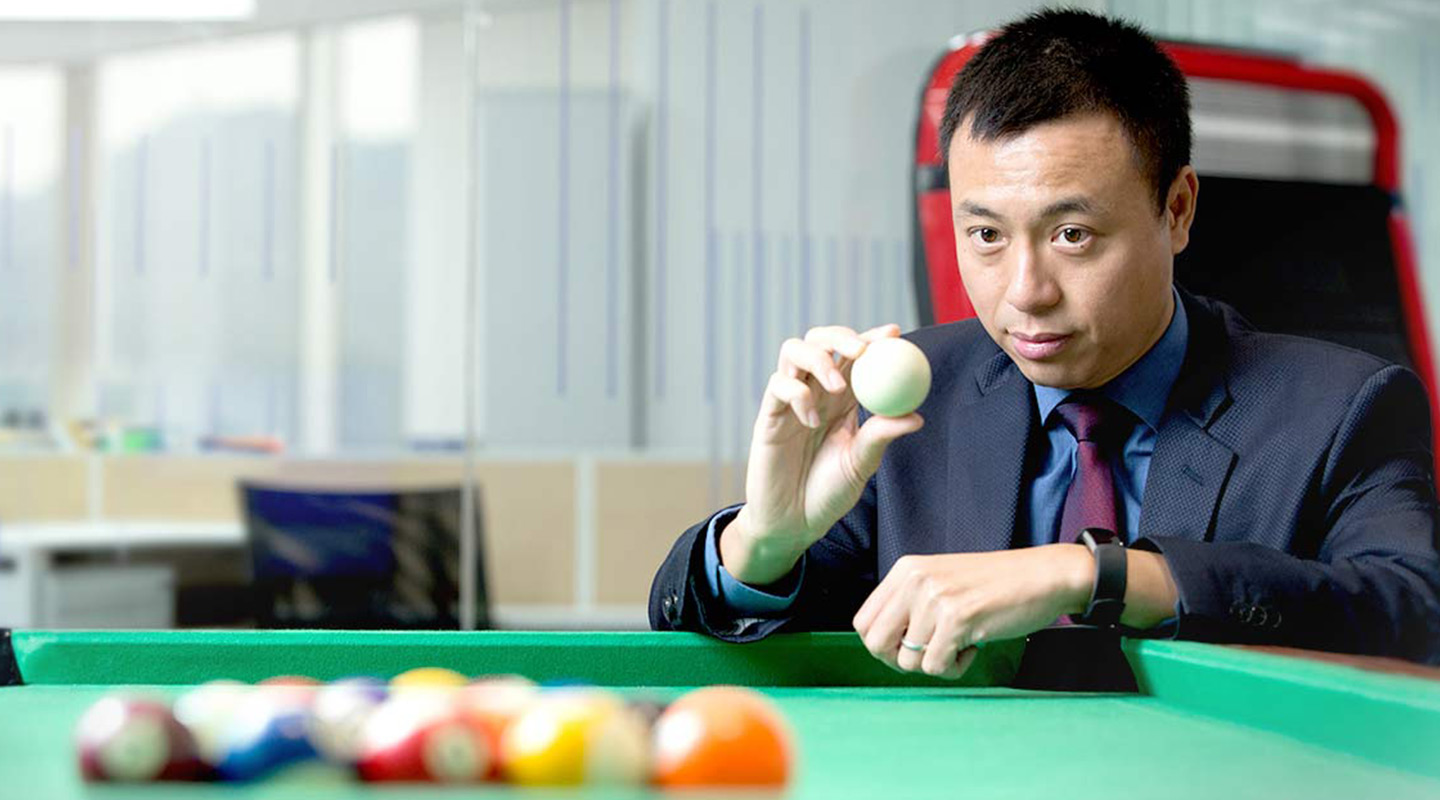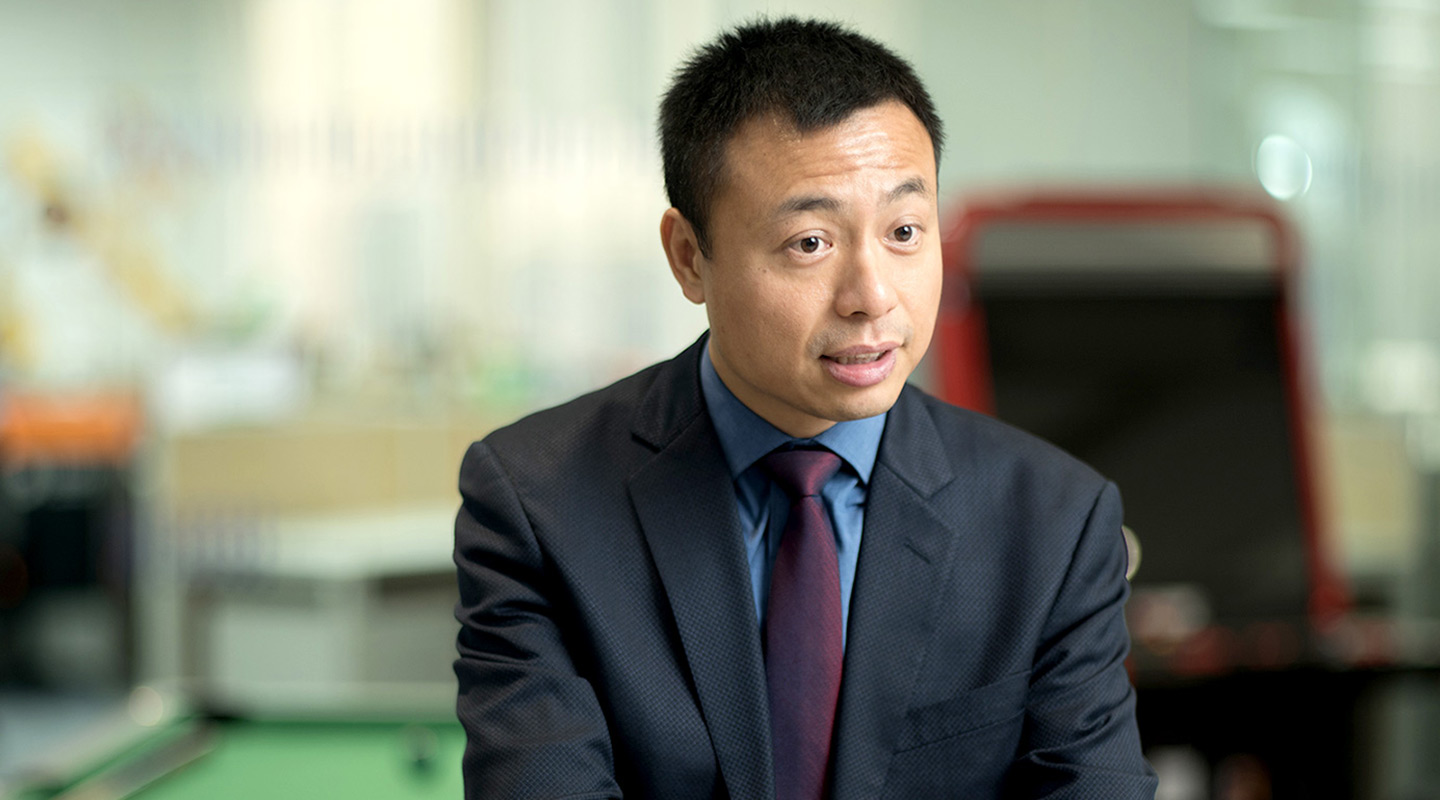Dear readers, With the launch of e-newsletter CUHK in Focus, CUHKUPDates has retired and this site will no longer be updated. To stay abreast of the University’s latest news, please go to https://focus.cuhk.edu.hk. Thank you.
The Tao of Entrepreneurship
Lap Man Navigates the Local Startup Scene

The staff leisure corner of DYXnet Group caught my eyes: Not only did I spot a billiard table and a dart board machine but also other facilities like the snack corner and massage chairs. Lap Man, founder and CEO of the Group, grinned, ‘Staff are the most important resource of a company. A pleasant working atmosphere ignites their creativity and boosts their productivity. Money can buy optical fibres but not good staff.’ As a first generation technology entrepreneur, Lap Man has been in the telecommunications industry for two decades.
‘I majored in Japanese Studies at CUHK. Many people were surprised. To be frank, I couldn’t have embarked on my Internet career without the yearlong sojourn in Japan.’ His undergraduate years fell into the budding period of the Internet. Several Internet giants such as Netscape and Yahoo! were founded in 1994. As a sophomore, Lap Man was required to spend a year in Japan on exchange requirement, which turned out to be a watershed in his life.
‘Surfing the Net wasn’t convenient in those days. The exchange students at Sophia University were provided with computers connected to the Internet for easy access to information. After typing the keywords, I was dazzled by the texts and images that popped up on the screen. My life has been inseparable from the Net since then.’ The exchange experience groomed his self-learning and problem-solving capacities, and enabled him to romp the ever-changing realm of telecommunications.

Upon Lap Man’s return to Hong Kong, his elder brother was about to set up an Internet service provider. He therefore arranged to attend school on two days of the week, so as to squeeze time to assist his brother. The manpower shortage in the founding years gave Lap Man ample learning opportunities, from marketing to client servicing, which gradually helped him become au fait with how to run a company. After selling the startup, he rode the dot.com tide in the late 20th century at the age of 25 and founded DYXnet Group with $40m. The new startup aimed at providing Internet service in the Greater China Region.
His company’s business suffered from the burst of the dot.com bubble. ‘In 2003, the largest debt we owed was $50–60m. We were $26 m in debt to one vendor. Fortunately, we managed to persuade the creditor to accept a settlement and convince the shareholders to inject capital in the company to prevent liquidation. I learnt from it that good investors not only invest money but also share experience and provide guidance.’ Having survived the dot.com bubble, Lap Man then weathered SARS and the financial tsunami. ‘The local economy suffered a severe blow during SARS, but those in the West were still vibrant. As Hong Kong’s export industry wasn’t affected, I took the chance to absorb more manufacturing clients.’ The Group was able to sail through the financial tsunami unscathed, as Lap Man adjusted the service pricing to increase the company’s market share. His networking service has now extended to over 700 cities in the Asia-Pacific Region.
According to a survey on conducted by InvestHK in 2016, there were over 1,900 local startups, the majority of which, number 401, were in information, computer and technology. Different venture capital funds have emerged over the past five years, but very few of them focus on the Hong Kong market. Lap Man therefore co-founded Beyond Ventures with Hony Capital, eGarden Ventures and Hop Hing Group this October, in a bid to help local startups actualize their innovative business ideas and cultivate the local startup ecology. Apart from funding support, they have lined up some successful entrepreneurs to provide mentorship and help the startups grow and extend their business networks throughout Greater China and other parts of the world.
‘Most of the established Hong Kong entrepreneurs of my generation sought opportunities beyond Hong Kong, and many chose to stay behind in mainland China or overseas. I’d like to work with my partners to motivate the veterans to groom the young Hong Kong entrepreneurs and to help the local startup scene flourish.’

You’d find support from investors in China if you pitch to them a countrywide business plan. As a niche market with merely seven million, local startups usually encounter hiccups as venture capitalists seldom focus on the Hong Kong market. Lap Man tread the less travelled road, and was once queried, ‘Is Beyond Ventures a philanthropic initiative?’ On the contrary, he saw advantages in starting a business locally: Hong Kong’s geographical location attracts the influx of professionals, research-based technologies and capitals. The free flow of financial information also helps investors make informed decisions. A number of multinational corporations have already set up their regional headquarters in Hong Kong. ‘Why do investors favour the Silicon Valley and Greater China markets? Our local startups can be compared to those in Israel! I foresee more than five local “unicorns” will emerge by 2020, which are worth US$ 1 billion each.’ He targeted to spend several years to convince investors that Hong Kong has plenty of potential startups.
‘Starting a business is a marathon. Don’t aim to be the next startup unicorn, with increasing the company’s market worth the main goal. We have to explore our own startup route and raise our core competencies.’ In the early stages, Lap Man thought the focus should be on the core business, ‘If startups don’t consolidate their resources, wrong business decisions would be easier made with higher valuation and more funds being raised.’
Lao Tzu's ‘The highest good is like water’ has always been Lap Man’s favourite saying. Water can accumulate. It is both firm and flexible, and can smooth over or even change whatever’s in its way. ‘As long as we focus on the general direction and go with the flow, we will be prepared in all circumstances. It also applies to the business context and daily living.’ Lap Man continued his philosophizing:
‘Neither maximizing nor monopolizing should be the goal. Many startups approached me for financing. Even if I might not be interested in their projects, I tend to give advice and introduce potential clients or partners to them. It’d be beneficial to all.’ Lap Man believed that credibility is the cornerstone of entrepreneurship and life. ‘If no one trusts you, or is willing to fund or do business with you, how could you excel on your own?’
By Jenny Lau
Photos by Keith Hiro
This article was originally published on CUHK Homepage in Dec 2017.